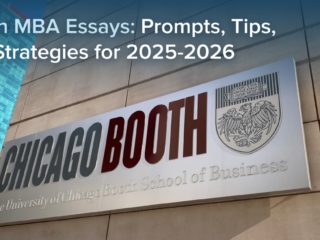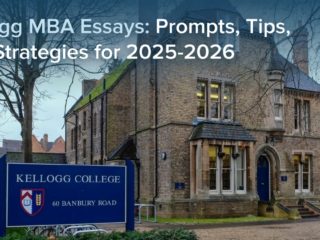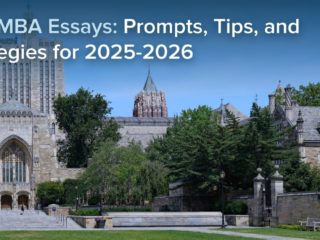| Getting your Trinity Audio player ready... |
Quick Answer
Wharton’s MBA application for 2025-2026 includes 2 required essays and 1 optional essay. The main prompts ask you to discuss your professional goals immediately post-MBA and after 3–5 years, and to reflect on how you will contribute to the Wharton community. To write standout responses, be specific, authentic, and show a deep understanding of Wharton’s values, curriculum, and culture. The optional essay allows space to address gaps or clarify unique circumstances.
Keep reading for the full essay prompts, strategic writing tips, and real examples to help you craft powerful Wharton MBA essays.
Here are the topics we’ll cover:
- Wharton MBA Essay Prompts for 2025-2026
- What Wharton Looks for in MBA Essays
- How to Answer Wharton Essay 1
- How to Answer Wharton MBA Essay 2
- Reapplicant Essay Strategy
- Optional Essay Strategy
- Common Mistakes to Avoid in Wharton MBA Essays
- Successful Wharton MBA Essay Examples
- Final Checklist Before Submitting
- Key Takeaways
- Frequently Asked Questions (FAQ)
- What’s Next
Wharton MBA Essay Prompts for 2025-2026
For the 2025-2026 application season, Wharton requires 2 short answer essays and 1 longer essay. Additionally, candidates may submit an optional essay.
These Wharton MBA essay questions ask applicants to communicate their professional goals and demonstrate their fit with the program.
The Wharton MBA essays include:
Essay 1: Two Short-Form Questions
The UPenn Wharton short answer questions are:
- What is your immediate post-MBA professional goal? (50 words)
- What are your career goals for the first three to five years after completing your MBA, and how will those build towards your long-term professional goals? (150 words)
Essay 2: Long-Form Essay
Taking into consideration your background — personal, professional, and/or academic — how do you plan to add meaningful value to the Wharton community? (350 words)
Reapplicant Essay
Please use this space to share with the Admissions Committee how you have reflected and grown since your previous application and discuss any relevant updates to your candidacy (e.g., changes in your professional life, additional coursework, and extracurricular/volunteer engagements). (250 words)
Additional Information Essay
Please use this space to share any additional information about yourself that cannot be found elsewhere in your application and that you would like to share with the Admissions Committee. This space can also be used to address any extenuating circumstances (e.g., unexplained gaps in work experience, choice of recommenders, inconsistent or questionable academic performance, areas of weakness, etc.) that you would like the Admissions Committee to consider. (500 words)
KEY FACT:
Wharton requires 2 short answers and one long-form essay in its 2025-2026 MBA application.
What Wharton Looks for in MBA Essays
Wharton’s MBA admissions team is looking for the following:
- Professional clarity: Communicate a strong understanding of your target role, function, and industry after graduation.
- Your career vision: Share context for your longer-term career goals and your motivations for pursuing them.
- Planned impact: Include specific ways that you’ll add unique value to the Wharton community.
- Authenticity: Focus on your true goals and genuine reflection, rather than on what you think the admissions committee wants to hear.
There’s not a lot of room for fluff. As a result, you need to be specific, to the point, and demonstrate self-awareness.
Check out Wharton’s Tips from the Admissions Committee in the essay section on the admissions website.
TTP PRO TIP:
Be specific and to the point to stay within the word count limits.
How to Answer Wharton Essay 1
Prompt 1
What is your immediate post-MBA professional goal? (50 words)
Here are our Wharton MBA essay tips for Essay 1:
- Provide a specific title, function, and industry for your post-MBA goal. Also, you do not need to provide the rationale for pursuing this goal.
- You might also include what you hope to accomplish in your immediate post-MBA role and which experiences and skills you’ll leverage from your current career.
TTP PRO TIP:
Be specific rather than generic about your post-grad goals and include your target title, function, and industry.
Prompt 2
What are your career goals for the first three to five years after completing your MBA, and how will those build towards your long-term professional goals? (150 words)
Build on your first response to discuss what’s next and what impact you intend to make in this timeframe. Additionally, communicate how your short-term career goals will help you work toward your long-term professional goals.
As Wharton’s admissions committee explains, “This question isn’t about precision, it’s about context. Giving us insight into your aspirations helps us better understand your motivations. Successful responses will show both focus and self-awareness.”
Therefore, ensure that your response provides direction and context, but also highlights your self-awareness.
Talk with current students, alums, and other professionals in your target career to ensure that the goals you share are realistic and achievable.
TTP PRO TIP:
Demonstrate both focus and self-awareness when writing about your career goals.
How to Answer Wharton MBA Essay 2
Prompt: Taking into consideration your background — personal, professional, and/or academic — how do you plan to add meaningful value to the Wharton community? (350 words)
This essay requires research and reflection. First, you must understand what Wharton offers someone with your goals. Next, you must understand the program’s core values. Finally, you must tie what makes you unique in how you’ll make an impact in the Wharton community.
However, this essay is not just about creating a list of clubs and organizations you plan to join. Instead, it’s about understanding who you are and how that will manifest in the Wharton MBA.
As Wharton’s admissions committee explains, “Rather than focusing on what you’ll do, focus on how you’ll show up and why that matters.”
TTP PRO TIP:
Essay 2 is not a place to simply list the clubs and organizations you plan to join.
Reapplicant Essay Strategy
Prompt: Please use this space to share with the Admissions Committee how you have reflected and grown since your previous application and discuss any relevant updates to your candidacy (e.g., changes in your professional life, additional coursework, and extracurricular/volunteer engagements). (250 words)
If you are a reapplicant to Wharton, this essay is required.
Wharton’s MBA admissions committee wants to understand how you’ve grown since you last applied. Specifically, what are the things you’ve done to improve your candidacy? Additionally, how do these improvements enable you to contribute effectively?
Reapplicants must take stock of where they may have fallen short previously and show how they’ve improved. Ideally, you can highlight changes and improvements across several areas. Additionally, you may have refined your career goals. If so, share that as well. Finally, you’ll make a stronger case for why you belong at Wharton.
TTP PRO TIP:
The reapplicant essay is an opportunity to show how you’ve grown since you last applied.
Optional Essay Strategy
Wharton’s optional essay is a good opportunity to provide additional context for your application.
Use the optional essay if you have:
- unexplained gaps in your employment
- academic performance issues
- rationale for selecting your recommenders
- other areas of weakness to address
You do not need to repeat content that you’ve already shared elsewhere. Additionally, you do not need to tell a story. Instead, use direct language — paragraphs or even bullet points are fine.
Finally, Wharton’s admissions committee notes, “Acknowledging something you view as a weaker part of your application will not disadvantage you.”
TTP PRO TIP:
The optional essay is a good opportunity to address weaknesses and extenuating circumstances. Use it!
Common Mistakes to Avoid in Wharton MBA Essays
Here are the common mistakes to avoid when writing Wharton MBA essays:
- Being too generic. Ensure that your career goals are specific. Additionally, identify unique ways that you intend to contribute to the Wharton community.
- Writing what you think the admissions committee wants to hear. Admissions committees can tell when you’re pandering to them. Instead, present your goals and intentions with authenticity — the truth is much more interesting than fiction!
- Ignoring your fit with the Wharton community. Demonstrate that you understand the values of the program, along with how you’ll contribute. Additionally, avoid the temptation to share what the admissions committee already knows. Instead, focus on communicating your unique value proposition.
- Misusing the optional essay. Avoid the temptation to share something the admissions committee doesn’t ask for. Instead, follow the instructions and only use the optional essay if you need it.
TTP PRO TIP:
Successful essays are genuine and authentic rather than pandering.
Successful Wharton MBA Essay Examples
Every candidate has a unique story to tell. That said, we’ve noticed a few patterns over the years across Wharton essays that worked.
Here are a few Wharton essay examples:
- Professional clarity — A candidate outlined her intended transition from a PR and communications role at an agency to a product marketing career at an early-stage B2C startup.
- Community impact — An applicant described the nonprofit mentorship program he created at his organization and how he would bring that template to the Wharton Social Impact Club.
- Overcoming weakness — A candidate discussed a career gap due to a family situation in the optional essay, providing additional context and framing the lessons learned.
These Wharton essay examples share a few of the ways applicants have answered the prompts. However, there are many ways to approach these. Successful Wharton essays share unique goals, contributions, and stories.
TTP PRO TIP:
There are many different approaches to successful essays.
Final Checklist Before Submitting
Before submitting your Wharton MBA application, ask yourself:
- Have I effectively answered the Wharton MBA essay prompts?
- Do my essays show authenticity?
- Have I demonstrated a strong fit with Wharton’s culture?
- Did I proofread for typos, grammar, and other errors?
- Did I stay within the word count limit?
Review your application with fresh eyes and ensure that it puts your best foot forward in the MBA application process.
Key Takeaways
As one of the best MBA programs in the world, Wharton is incredibly selective. However, the program is also an amazing launchpad for the next step in a professional career.
Follow the advice in this article to shine a light on your best experiences and attributes. Good luck!
Frequently Asked Questions (FAQ)
How long should each Wharton MBA essay be?
Your responses for the prompts in Essay 1 should be 50 and 150 words, max. Additionally, your response for Essay 2 should be a maximum of 350 words. Finally, your optional essay should be a maximum of 500 words.
What is Wharton looking for in essay responses?
Check out our Wharton MBA essay analysis in this article. Specifically, Wharton’s MBA admissions committee is looking for clear career goals, context for your career vision, and demonstrated fit.
Should I write the optional Wharton MBA essay?
Read the Wharton MBA essay advice in this article. Specifically, you should write the optional essay only if you need to address circumstances described in the prompt.
Can I reuse essays from other MBA applications for Wharton?
Not really. For Essay 1, you may borrow information from other MBA applications. However, you must tailor your response to the Wharton prompt and word count limits. Additionally, your response to Essay 2 should be written only for Wharton.
What’s Next
The Wharton MBA essays are your opportunity to make a specific case for the program. By being specific and intentional, you can tailor your message to Wharton.
If you’re serious about applying to Wharton and other top MBA programs, start early and get a professional opinion. Target Test Prep’s experienced MBA admissions consultants will guide you every step of the way.



